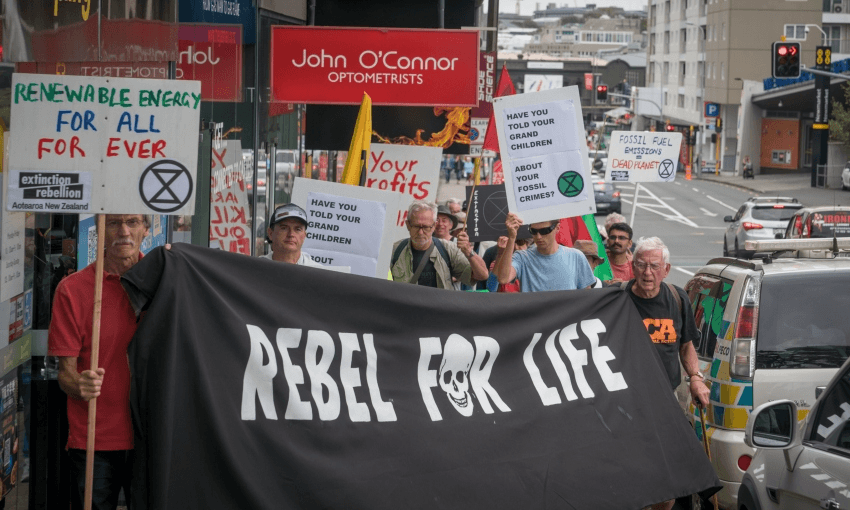Tomorrow Wellington will be the first city ‘disrupted’ in a series of protests by global environmental group Extinction Rebellion. Its spokesperson Dr Sea Rotmann explains why they’re choosing disorder.
Last week School Strike 4 Climate organised 170,000 people – that’s over 3.5% of Aotearoa’s population – to take to the streets to demand action on the climate crisis. Want to know why this is a game-changing number? Because social scientists have identified that non-violent civil disobedience is the most powerful way to foster change, and movements of this kind that engage 3.5% of a population often succeed in bringing about change.
Reaching that number was an incredible effort – and now we need to keep that pressure on. That’s where Extinction Rebellion comes in. We are one of the fastest-growing environmental activist movements of all time, and we use civil disobedience and disruption to tell our story. You may have seen the Extinction Rebellion protests back in April in the United Kingdom? Well, we’ve been rebelling here in Aotearoa too, admittedly on a smaller scale – for now!
Extinction Rebellion already has over 20 branches across New Zealand, which are all pushing for change through creative, non-violent actions that are directed at those who are most responsible for this mess. We’ve highlighted the sour side of intensive dairy farming by pouring milk down the steps of parliament, pushed for an end to our reliance on fossil fuels by blockading a train, and led tours of Wellington’s biggest coal criminals.
Sometimes rebelling against the status quo does result in some of our rebels getting arrested. We recognise that arrest with comparatively little consequence is a privilege that is not available to much of the global population. We do not want to glorify getting arrested, but instead, use it as a tool to draw attention to issues of environmental and climate justice. We are aware that arrest is only one of many ways of taking a stand, and at times like this, we need to make use of them all.
We also realise that our disruption may interrupt people’s lives a little, and for this, we sincerely apologise. But we want you to know that we only do this because the disruption we cause is extremely minor compared with what is coming.
Extinction Rebellion does not aim to provide a solution to climate change but to act as a fire alarm. We want to wake up the sleeping inhabitants of our burning home and to draw attention to the pyromaniacs (aka the fossil fuel industry) still busy setting rooms on fire.
Just like the climate strikers, we want to mobilise others to join the rebellion for climate and environmental justice. A rebellion we know has been fought for centuries by generations before us with many different voices, especially those of indigenous activists, which we must listen to now. Too many of us did not listen soon enough, and we have spent too long hoping that these problems would just go away or that “someone” would fix it. We have been complacent, and now it is almost too late.
Coral reefs are going extinct, whole ecosystems are collapsing, forests are burning on every continent, the ice sheets are melting, there’s an insect apocalypse and there are already millions of desperate climate refugees who are being displaced amid politics of tightening borders. Closer to home, some beech forests are failing to cope with the temperature change and 100-year weather events seem as regular as world cups.
Extinction Rebellion recognises that for many the reaction to this is grief. With that grief comes an uncomfortable truth: that we have participated in and benefited from the things that caused this crisis. We come to this collective grief over huge, devastating losses that continue to get worse and are already being felt by people across the globe. Our future as a species and much of the life on our planet is at stake.
It is this grief that gives us the courage to rebel and the conviction to demand more of governments across the globe. We have three clear demands, that government: tells the truth by declaring a climate and ecological emergency, working with other institutions to communicate the urgency for change; acts now to halt biodiversity loss and reduce greenhouse gas emissions to net-zero by 2025; and goes beyond politics and lets decisions on climate and ecological justice be made by a Citizens’ Assembly that is advised by independent experts and guided by tangata whenua.
We believe that achieving these three demands will provide a way to reduce the worst of the catastrophe that we are rapidly sliding towards. If you want these things too – a better future for our planet, a safer place for children to grow up, and justice for those who are affected by the climate and ecological crisis – please, join us.
Aotearoa New Zealand will be kicking off Extinction Rebellion’s international week of action on Monday 7 October in Wellington. We will be holding our biggest action yet, with over 60 major cities around the world following us throughout the week. Find out how to get involved here, follow what we’re up to on Twitter and Instagram, and see you on the streets! #rebelforlife

